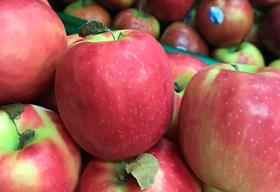
The head of Australia’s peak apple industry body is confident fruit from the country’s mainland will enter China as a premium product once access is granted.
Phil Turnbull, chief executive of Apple and Pear Australia (APAL), visited the People’s Republic last month to represent the industry under the Taste Australia stand at the China Fruit & Vegetable Fair.
Joined by APAL’s director of global development, Andrew Hooke, and quality project manager, Andrew Mandemaker, Turnbull also held meetings with officials from the China Entry Exit Inspection and Quarantine Association (CIQA) and the General Administration of Quality Supervision, Inspection and Quarantine(AQSIQ) regarding market access for mainland apples.
The trio also met with executives at e-commerce giant JD.com, where they discussed the potential to build on existing programmes for Australian apples in China, which are currently being delivered solely by suppliers from the island state of Tasmania.
“As our discussions progressed, it became apparent that Chinese consumers are developing a taste for premium, quality, Australian apples from Tasmania,” Turnbull said in an article published on APAL’s website.
“If we can build on this demand, through forming relationships with retailers, there’s a strong likelihood that mainland Australian apples will also enter the market as a premium product once access negotiations are complete.”
Turnbull said mainland suppliers would initially focus on servicing Tier 1 cities with branded products.
With Chinese officials agreeing to protocols for a number of Australian stonefruit categories late last month, mainland apples now move to the top of the market access priority list, under a two and two agreement signed between the two countries.
Aiding the cause, representatives from China’s Ministry of Commerce visited APAL’s office late last month to gain a better understanding about Australian food safety and traceability standards.
“The delegation was keen to understand how the quality of our fruit is protected and maintained from the orchard through the entire supply chain,” explained Hooke.
APAL executives were also keen to discuss the importance of protecting importers’ rights in relation to intellectual property and brand in China.



